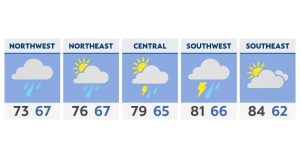German Chancellor Olaf Scholz visited the White House on Friday for a private meeting with President Joe Biden as both allies become increasingly vocal about their concerns that China may step off the sidelines and supply weapons to Russia for its invasion of Ukraine.
What You Need To Know
- German Chancellor Olaf Scholz visited the White House on Friday for a private meeting with President Joe Biden
- Both allies have become increasingly vocal about their concerns that China may step off the sidelines and supply weapons to Russia for its invasion of Ukraine
- Such a step could dramatically change the war’s trajectory by allowing Moscow to replenish its depleted stockpiles
- China is Germany’s top trading partner, and European nations have generally been more cautious than the United States in taking a hard line with Beijing, but there are signs that may be shifting as global rivalries grow more tense
Such a step could dramatically change the war’s trajectory by allowing Moscow to replenish its depleted stockpiles.
China is Germany’s top trading partner, and European nations have generally been more cautious than the United States in taking a hard line with Beijing. However, there are signs that may be shifting as global rivalries grow more tense.
In a speech to the German parliament on Thursday, Scholz called on China to “use your influence in Moscow to press for the withdrawal of Russian troops, and do not supply weapons to the aggressor Russia.”
The U.S. and Germany have worked closely together to supply Ukraine with military and humanitarian assistance. But there has also been friction over issues such as providing tanks, and Washington has occasionally grown frustrated with Berlin’s hesitance.
Maintaining a steady flow of weapons to Kyiv will be critical in the war’s second year, especially with both sides planning spring offensives.
“Together, we’ve worked in lockstep to supply critical security assistance to Ukraine,” Biden said Friday. “As NATO allies, we’re making the alliance stronger and more capable.”
White House national security spokesman John Kirby said Thursday that the U.S. has not seen any indication that China has made a decision on whether to provide weapons to Russia.
Scholz last visited the White House a little more than a year ago, shortly before Russia invaded Ukraine.
“Russia was amassing its troops. … And we made it clear that if he moved, we would both respond. And together we made good on that promise,” Biden said Friday.
Very little of Friday’s meeting was open to the public, and no announcements are expected afterward. Unlike formal state visits, such as when French President Emmanuel Macron came to Washington last year, there was no pomp and ceremony. Scholz’s trip lacked the customary news conference where the two leaders take questions from reporters representing both countries.
Kirby described it as a “true working visit between these two leaders.”
Scholz on Friday committed to continuing to support Ukraine “as long as it is necessary,” a similar promise to one Biden has made.
“The transatlantic partnership is really in a very good shape today, and this is very much thanks to your leadership,” Scholz told Biden before their private meeting.
In an interview with German broadcaster Welt, opposition leader Friedrich Merz accused Scholz of being secretive about his trip to Washington, which is taking place without the customary press pack in tow. Merz suggested that Scholz had to smooth ruffled feathers over the deal to provide tanks to Ukraine.
Scholz dismissed any notion of discord between allies.
Asked by The Associated Press about the circumstances of his visit, Scholz said he and Biden “want to talk directly with each other,” and he described “a global situation where things have become very difficult.”
“It is important that such close friends can talk about all of these questions together, continually,” he said.
Jake Sullivan, Biden’s national security adviser, hinted at some tension between the two countries on Sunday when appearing on ABC’s “This Week.”
He said Biden originally decided against sending Abrams tanks to Ukraine, believing they wouldn’t be immediately useful for Ukrainian forces. However, Sullivan said, Germany would not send its Leopard tanks “until the president also agreed to send Abrams.”
“So, in the interest of alliance unity and to insure that Ukraine got what it wanted, despite the fact that the Abrams aren’t the tool they need, the president said, ‘OK, I’m going to be the leader of the free world,'” Sullivan said. “‘I will send Abrams down the road if you send Leopards now.’ Those Leopards are getting sent now.”
Scholz’s government has denied there was any such demand made of the U.S.
Max Bergmann, a former State Department official who leads the Europe Program at the Center for Strategic and International Studies, said the U.S. has often wanted Germany, the world’s fifth-largest economy, to be more forceful on the global stage.
“There’s a hope that, instead of us having to push all the time, that Germany would take a leadership role,” he said.
Bergmann said Germany has gone a long way toward strengthening its defense, but added that there’s more work to do.
“The German way of seeing the world doesn’t always align with the U.S. way of seeing the world,” he said.




